Author: 0xWeilan, Source: EMC Labs
The giant wheel of the cycle is turning, pushing the market, which was once full of fear and doubt, into a new stage, and the trading sentiment is suddenly heating up.
As we predicted: the internal adjustment of the crypto market has been completed, and an external trigger point will come this month - the US presidential election on November 6, with the Republican candidate Trump, who has a friendly attitude towards Crypto, winning, and the BTC price continuously hitting new highs, approaching $100,000.
The conclusion of this annual major event has led traders in various financial markets to gradually emerge from the chaos and uncertainty and return to the established trading rhythm, and the US stock market has resumed its upward trend. The "Trump economic policy" expectation has become the main trading focus, with Tesla, MicroStrategy and others becoming the biggest gainers.
BTC has also suddenly started up from the slump at the end of October, breaking through multiple technical resistances such as the "new high consolidation zone" and the "upward trend line" at one go, continuously hitting new highs, with the highest reaching $99,860, recording a substantial 37.42% increase for the month.
Accompanying the heating up of the trading market, November saw a huge influx of funds, with a total of $25.9 billion inflows recorded for the month, making it the largest monthly inflow in the history of the Crypto market.
Against the backdrop of BTC approaching the $100,000 mark, the continuous inflow of funds has finally triggered a sharp and widespread rally in Altcoins represented by ETH.
Based on a comprehensive multi-dimensional judgment, EMC Labs believes that the second wave of the "upward cycle" of the crypto market has already started, and funds in the market will gradually flow into Altcoins, forming a widespread rally.
The biggest uncertainty is the potential conflict between the "Trump economic policy" that may trigger high inflation and the Federal Reserve's ongoing rate cut pace. However, this uncertainty is just a minor discord in the larger certainty, and is not enough to change the overall trend of market operation.
Macro Finance: Trump Economic Policy
The "Trump economic policy" mainly includes tax cuts and deregulation, protectionist trade policy, energy independence and support for traditional energy, fiscal expansion and debt risk, immigration and labor force policy, and political and debt management.
These economic policies guided by the "America First" spirit will pose a great challenge to the existing global trade and financial order, triggering unpredictable conflicts and chaos. Even within the US, there will be seemingly irreconcilable contradictions in areas such as economic growth, illegal immigration, and the financial system.
Deporting illegal immigrants and raising tariffs could push up inflation, while the federal interest rate is still at a relatively high level, making it difficult for the Fed to cut rates. Without rate cuts, the government's fiscal expansion will undoubtedly be more difficult, and the high debt level will be a heavy burden for the US government.
The Federal Reserve, which is in the process of cutting rates and reducing its balance sheet, is also facing a dilemma. The unexpected rebound in the US CPI in November means the need for rate cuts has greatly diminished, even though the dot plot and the Fed's meeting minutes indicate that a 25-basis-point rate cut in December is still a high probability event, the pace of rate cuts in 2025 is likely to slow down.
Powell hopes to uphold professional integrity, maintain economic stability, and normalize the inflation level. But Trump has clearly stated that he will fulfill his campaign promises through reform and conflict - lowering corporate taxes and increasing import tariffs to provide more domestic jobs. Their propositions are almost irreconcilable, and the contradiction has already been publicly exposed.
Despite the great uncertainty, traders in various markets have already taken sides and made their decisions - long the US economy, with the most optimistic outcome being "high inflation, high growth".
In November, the Nasdaq, Dow Jones, and S&P 500 recorded gains of 6.21%, 7.54%, and 5.74% respectively, while the Russell 2000, which represents small and medium-sized enterprises, recorded an 11.01% gain and hit a new high.
In the bond market, the long-end and short-end yields at the end of the month were 4.177% and 4.160% respectively, both recording a slight decline, indicating that the bearish risk on US Treasuries has temporarily subsided.
The US dollar index continued to rise, closing at 105.74 in November, up 1.02% from the previous month, while the euro, renminbi, and yen all depreciated against the US dollar. The trend of global capital favoring the US financial market and buying US dollar-denominated assets is continuing.
Correspondingly, gold, which has been the recipient of global safe-haven funds, fell 3.41% during the month, recording the largest monthly decline in 14 months. As the post-pandemic era gradually unfolds, global liquidity is becoming increasingly abundant, and the risk appetite of global capital is rising. Equity assets, as well as Crypto represented by BTC, are the beneficiaries of this increase.
Crypto Assets: BTC Hits New High, Altseason Ready to Launch
In November, BTC opened at $70,198.02 and closed at $96,465.42, a 37.42% increase, with a volatility of 47.12% and effective volume expansion.
After returning to the "200-day moving average" and breaking through the "downward trend line" in November, BTC continued to achieve landmark breakthroughs in technical indicators this month, breaking through the resistance at the top of the "new high consolidation zone" that had been stuck for 8 months, and stepping back onto the "upward trend line" for the first time in 4 months.
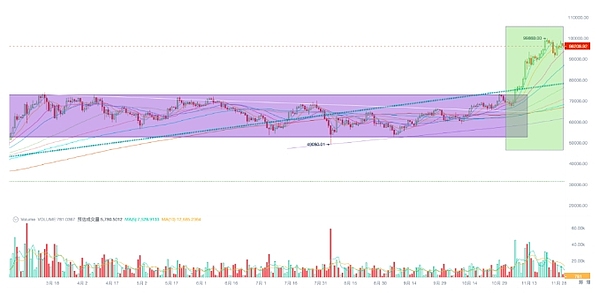
BTC Daily Price Trend
On the monthly chart, BTC has achieved 3 consecutive months of gains with steady volume expansion, showing a healthy upward trend.
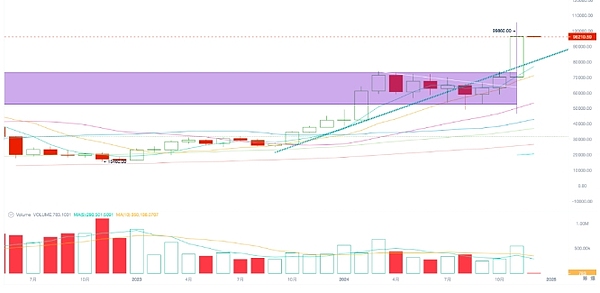
BTC Monthly Price Trend
In previous research reports, we have repeatedly emphasized that over 30% of BTC in the new high consolidation zone from March to October this year has undergone address transfers, and this upward repricing has occurred repeatedly in past cycles, becoming an internal structural support for future price increases.
The final breakthrough in price, however, requires the catalysis of external conditions.
The biggest global event in November was Trump's re-election as US president, and his previous enthusiasm for Crypto and "promises" during the campaign process have become the emotional catalyst for BTC to break through the "new high consolidation zone" that had been stuck for eight months.
Is BTC's "Trump rally" sustainable? EMC Labs believes that whether it is the "21st Century Financial Innovation and Technology Act" proposed last year, the "American Bitcoin Reserve Bill" this year, or the recently passed "Bitcoin Rights Act" in the Pennsylvania House of Representatives, they all show that the US's adoption of Crypto is gradually shifting from "allowing" to "promoting", with the goal of gaining control over BTC-represented crypto assets and the blockchain industry (public chains, infrastructure, and decentralized applications) through legal and regulatory support and national strategies, ensuring the US's dominant position in this emerging track.
Therefore, the support from US policies and the continued adoption of Crypto by traditional institutions including financial institutions and listed companies can be expected in the coming years. At no point in history has the blockchain industry and crypto assets received such a strong degree of acceptance and adoption.
Surging Liquidity: Two Major Channels Resonate to Create a Historic Record
Continuous inflow of funds is the material support for the bull market.
In November, the combined inflow through the BTC Spot ETF and stablecoin channels reached $25.9 billion, setting a record for the largest single-month inflow on record. Of this, the ETF channel accounted for $5.4 billion and the stablecoin channel $19.5 billion. In November, the ETF inflow exceeded that of February, making it the largest inflow month.
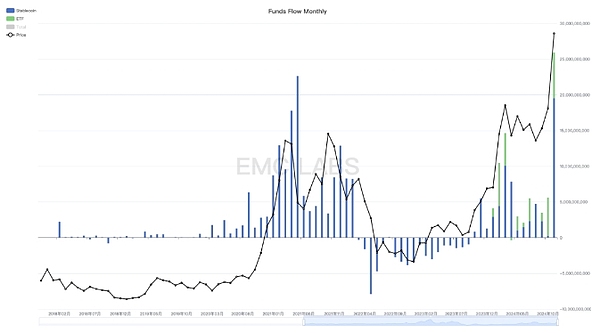
Monthly Statistics of Crypto Market Fund Flows
Since October, as the US election drew to a close, the ETF channel funds were the first to be activated. This channel has been gradually increasing in inflow size since September, with $1.2 billion, $5.4 billion, and $6.4 billion flowing in from September to November respectively. We have previously emphasized that the funds in the ETF channel have independent will and will gradually take control of BTC's price trend. This has been fully reflected in the recent market performance.
Compared to the "big brother" who bravely takes on the heavy burden, the stablecoin channel funds seem to be a bit late to the party. After entering November, it was not until BTC prices continued to break through that they began to show a surge in inflows. However, the total monthly inflow of stablecoin channel funds reached $19.5 billion, far exceeding the ETF channel funds.
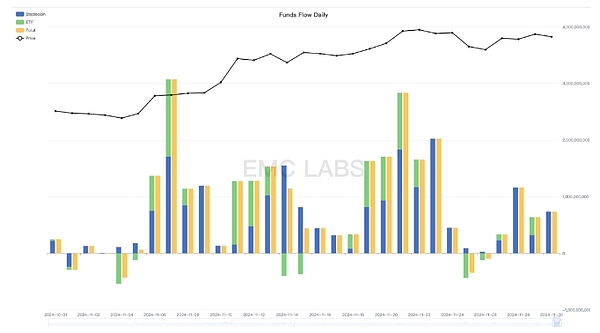
Daily statistics on crypto market capital flows
On November 22, when BTC challenged the $10,000 mark, on-chain funds began to activate ETH, with a daily gain of 9.31%. In November, ETH's cumulative gain reached 47.05%, surpassing BTC, and the market seems to be opening up the Altseason.
EMC Labs believes that after BTC breaks through the $10,000 mark, the Altseason will gradually open up. After the Altseason opens up, the market will gradually show: 1. ETH hits a new all-time high; 2. The market rallies across the board; 3. The market's main trend is gradually identified.
Long-short game: Liquidity spawns the second wave of sell-offs
The cycle is a game of accumulation and distribution of chips between the long and short players in the time and space domain.
The long players accumulate chips during the downtrend, consolidation, and recovery periods, and conduct continuous sell-offs during the uptrend and transition periods, until the liquidity can no longer absorb the selling pressure, and the market reverses.
In this cycle since January 2024, the long players have carried out the first round of large-scale sell-offs, and after the market entered a consolidation phase in March, they have returned to the state of chip accumulation. In November, with the recovery of liquidity and new highs in prices, the long players have already initiated the second round of sell-offs, which is also the last round of large-scale sell-offs in this cycle.
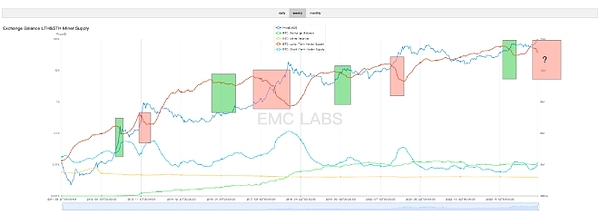
BTC long-term holder sell-off history over the past 15 years
As of the end of September, the long-term holders held 14.22 million BTC, and by the end of November, the sell-off position had reached 13.69 million BTC, with a "sell-off scale" of 530,000 BTC over the two months.
During the uptrend, the motivation for the long-term holders to sell is the price increase brought about by liquidity, and the price increase is also a self-proving process of the market, which will trigger more capital inflows.
The second sell-off by the long-term holders has just been going on for 2 months, and with the continued increase in liquidity, it is expected to continue into the first half of 2025.
Conclusion
In November, the cycle once again demonstrated its powerful market adjustment capabilities.
EMC Labs believes that the fundamental reason for the rise in BTC and the entire crypto market is that, on the basis of a well-structured internal adjustment, the continuous interest rate cuts by the world's major economies and the significant increase in investor risk appetite are the fundamental reasons. In addition, the significant increase in adoption and the expected US national policy have also provided tremendous emotional and material momentum.
We believe that these external factors will continue to provide momentum support for the crypto market in the coming year. Therefore, after the crypto bull market restarts, it will continue to rise, with some twists and turns in the middle, but the latter part of the uptrend is destined to provide more generous returns for long-term investors.







